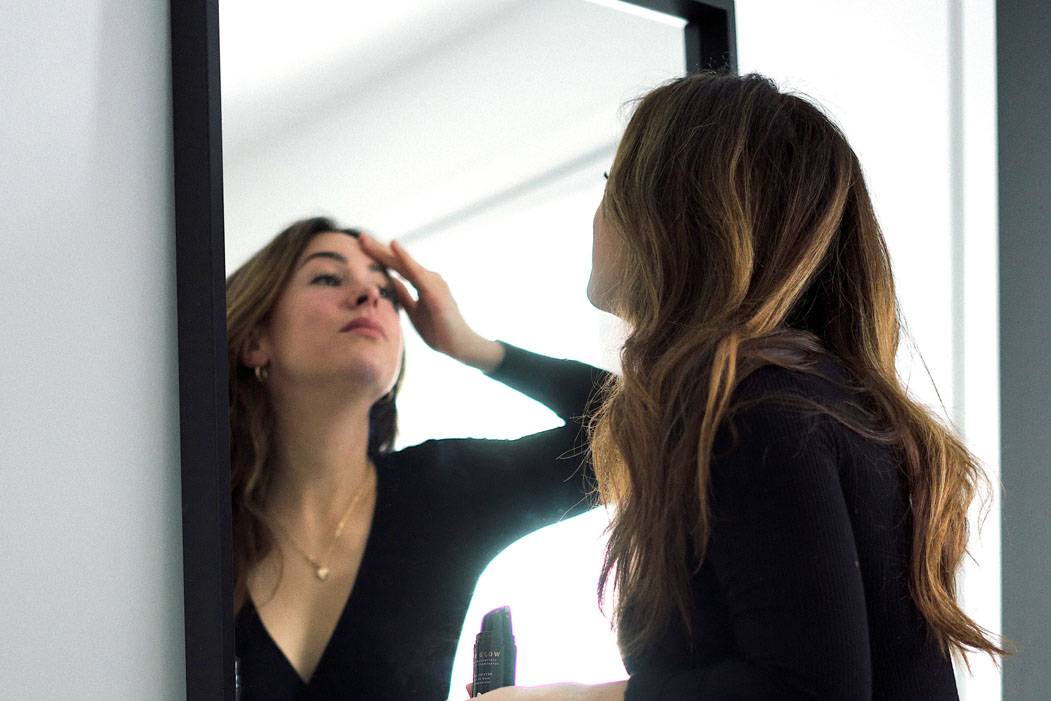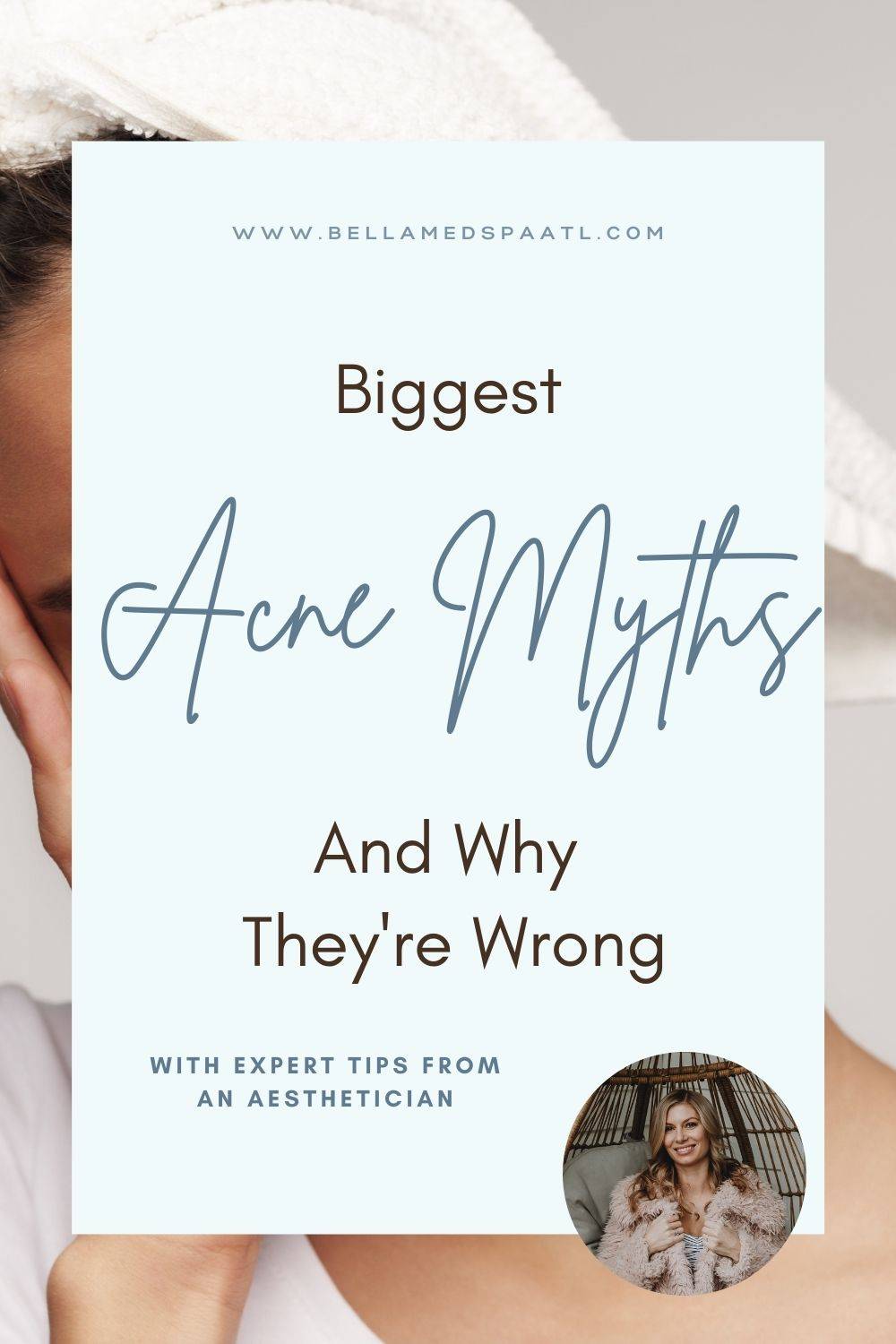Acne is one of the most common skin disorders in the USA (and the entire world, for that matter). Nearly 85% of Americans are affected by acne at least once in their lives, so it doesn’t come as a surprise that there are hundreds of myths around the condition.
As a professional aesthetician, I’m a huge believer in getting facts right and educating clients on what is and what isn’t true regarding skin concerns. Not knowing what’s true and what isn’t mean you could waste a ton of time and money trying to fix an issue to no avail, but it can also cause stigma around your condition (something that sucks, especially when it’s on your face and can very quickly cause self-esteem issues.
Because acne tends to be one of the most talked-about skin conditions, I wanted to take a few moments to discuss some of the biggest acne-related myths out there to set the record straight.

Biggest Acne Myths and Why They’re Wrong
Acne equals poor hygiene
Acne is often associated with poor hygiene, and while bad habits could very well result in acne, it’s not always the case, so don’t be too quick to judge others (or yourself). In fact, most of the causes that trigger acne happen underneath the skin rather than on the surface. Poor hygiene is not usually the cause of acne. More common causes include hormonal issues and stress (read all about stressed skin here).
Retinoids cause acne
This is one of the acne myths that bothers me the most because I LOVE retinoids and their benefits. Seriously, retinoids are my favorite skincare ingredient and I would not, *ever*, advise someone to not implement them into their skincare routine unless there were health issues involved.
Sure, when you first start using retinoids, your skin might experience redness, sensitivities, and a few pimples here and there while it adjusts to the ingredient. That happens because retinoids exfoliate deeply, so everything that’s hiding under the surface of your skin might pop out. Essentially, your skin will purge out EVERYTHING that isn’t supposed to be there all at once.
Fortunately, this pretty much only happens at the very beginning when your skin is adjusting and the effects will diminish after the transition period is over (usually a few weeks). It’s definitely not ideal if you have an important presentation or date, but when that happens, it just means the retinoid is doing its job, so yay!
Washing Your skin more often will get rid of your acne
As I previously explained, acne rarely has anything to do with cleanliness, so over-washing your face will not quite do the trick and it will likely result in dryness and irritation in the long run.
Yep, you SHOULD wash your face daily to remove bacteria and excess oil (twice a day at most), but don’t overdo it and definitely don’t do it with the intention of reducing acne because you’re bound to be very disappointed.
Toothpaste will clear acne
Nope, nope, nope. It will NOT! Acne is a skin condition and not just a pimple you can “freeze” with toothpaste. Please tell everyone to stop using products on their faces that are not meant to be there!
Flurodies in toothpaste can actually worsen your acne. If you’re dealing with a zit you want to get rid of quickly, check out this post for pimple remedies instead (note that we’re talking about a pimple here, not a full acne breakout).
Makeup will worsen your acne
I (personally) prefer to go makeup-free and letting my skin breathe, but that doesn’t mean I’d ever advise my clients not to wear makeup if it makes them feel more confident.
Thanks to the beauty industry, there’s a plethora of makeup options out there that will not cause or worsen acne. As long as you use the right products, there’s absolutely no reason why you should avoid using makeup. As a rule, look for products that are labeled non-acnegenic and non-comedogenic when shopping and you’ll be good to go!
Only teenagers get acne
To our dismay, this it not true. A significant amount of adults still get acne well into their 30s and even their 50s. Luckily, adult acne is usually not as bad as it was back when you were 16, but it can still very much happen and cause you just the same stress as it did back in the day, so it’s important to treat it as soon as possible.
Acne is a cosmetic problem
Sure, acne might not cause significant health problems, but it can very well cause long-lasting self-esteem issues and as a result, deter you from living your best life. If you feel acne is stopping you from going out or making you feel badly about yourself, it’s incredibly important to take action in order to control it.
Luckily, there are a myriad of treatments available to reduce acne. My biggest advise would be to seek professional help instead of DIYing it. A professional will not only know how to tackle the problem, but they will also create a customized treatment that works for YOUR skin type, which is essential when dealing with any skin condition!
PIN THIS POST

